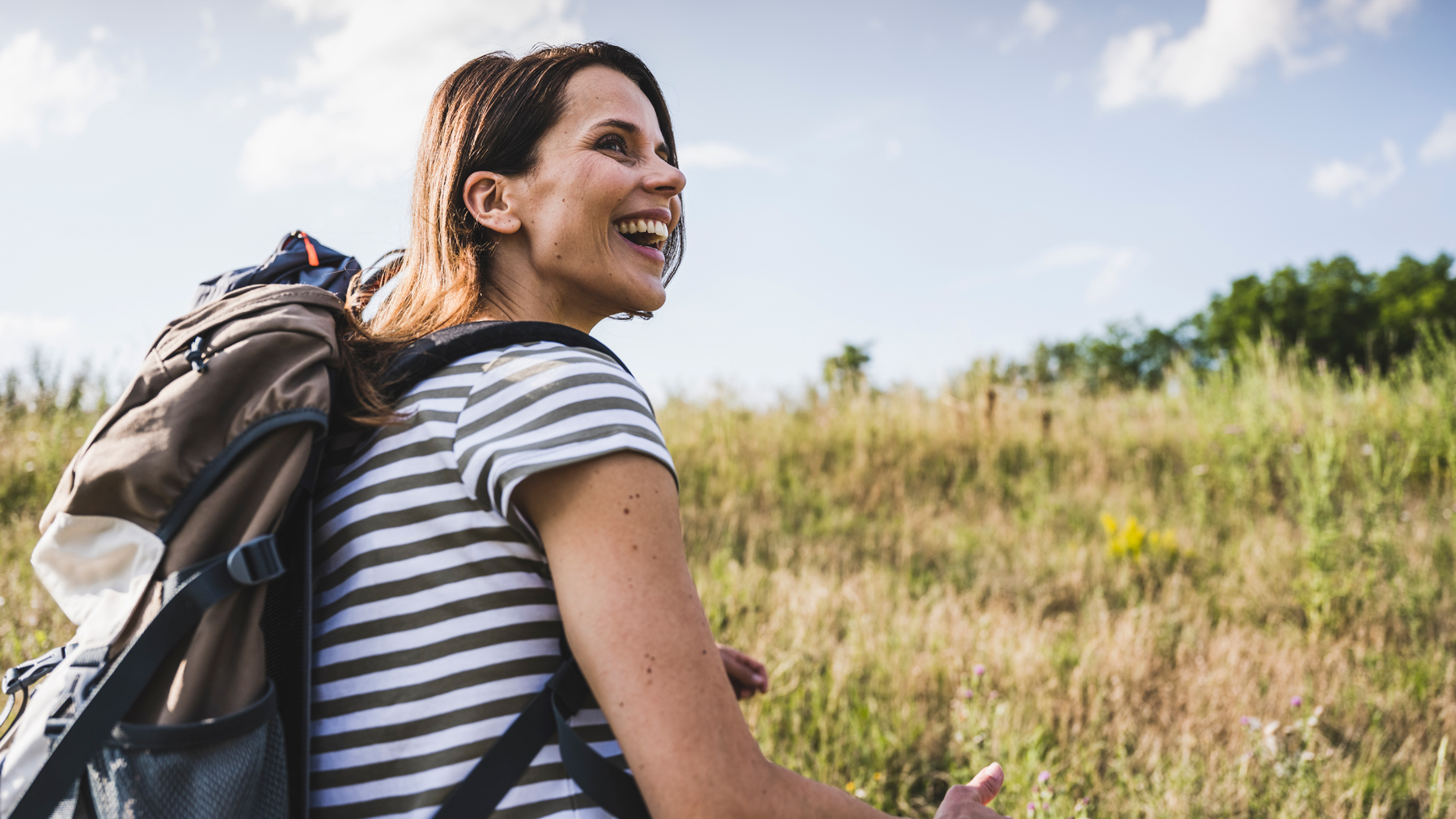What are the benefits of hiking?
What are the benefits of hiking, from spending time outdoors to improving your overall physical health? We talk to the experts and check out the latest research


Start your week with achievable workout ideas, health tips and wellbeing advice in your inbox.
You are now subscribed
Your newsletter sign-up was successful
What are the benefits of hiking? Whether it’s improving your mental health, giving you a sense of well-being by being out in nature, or improving your physical fitness and stamina, we’ve got the lowdown on all the positive aspects hiking can bring to your life.
While some of the benefits of hiking are immediate, such as reduced blood pressure and lower stress levels, other advantages take a little longer but can have a more significant impact. These include developing your core strength, improving your muscle tone, and even alleviating mental health conditions like depression and anxiety.
We’ve looked at the latest research and spoken to the experts to get a taste of all the benefits hiking offers. Once you’ve got the hiking bug, find the perfect pair of hiking boots with our guide to the best shoes for walking and hit those trails.

While earning a Bachelors in Environmental Design from the University of Colorado, Wesley spent four seasons building and maintaining trails. Trimble is the first known individual with cerebral palsy to hike the entire Pacific Crest Trail and the Colorado Trail. Through design, marketing, and communications, Wesley enjoys educating people about the importance of outdoor stewardship.
What are the benefits of hiking?
Just one in five of us meets the physical activity guidelines laid out by the Physical Activity Guidelines for Americans. These include recommendations of the following every week:
- Two hours and 30 minutes of moderate-intensity exercise, such as brisk walking
- One hour and 15 minutes of vigorous-intensity exercise, such as hiking uphill or with a weighted backpack
- 10 minutes of muscle-strengthening activities, such as weight training, twice a week
Hiking is a surefire way to meet each of those recommendations, and we’ve got the research to back it up. We’ve also spoken to Wesley Trimble of the American Hiking Society to get his take on why hiking is so great for your body and mind. So if you’re unsure whether hiking is a suitable physical activity, why not look at these key benefits?
1.Improves cardiovascular health
Hiking improves cardiovascular fitness, according to Harvard Health, particularly if you choose a hilly route, which forces your heart to work harder. And it’s not just for young people either. In a 2020 article for the International Journal of Behavioral Nutrition and Physical Activity, researchers concluded that older adults who walked more had lower systolic blood pressure than those with more sedentary lives. Downhill walking, in particular, is associated with positive effects on body mass index, insulin action, postprandial glucose and triglyceride handling and curbing C-reactive proteins, all of which affect cardiovascular health.
2.Improves core and leg strength
The muscles you use during a hiking session can vary depending on your route. Hillier, uneven terrains are great for building core strength, as you use those muscles to increase your stability. It can even help you improve your balance.
Start your week with achievable workout ideas, health tips and wellbeing advice in your inbox.
You may be weighing up hiking vs walking, the good news is that any kind of walking is great for your leg muscles, such as the calves, quadriceps, hamstrings and glutes, but climbing hills will activate them even more. As you head downhill, those glutes and thigh muscles work hard to keep you stable and balanced.
3.Boosts your mental health and wellbeing
The exposure to nature and daylight that you get while hiking can restore your emotional and mental health by:
- decreasing stress levels
- improving social skills
- boosting energy levels
- enhancing focus and reaction times
- releasing endorphins, the feel-good hormones
- allowing you to re-connect with nature
“There's some great research on the mental health benefits of hiking and walking in nature,” says Trimble. “Studies show walking in nature has been associated with reducing depression as well as improvements in memory and a reduction in anxiety. In addition, time spent in natural settings can alleviate symptoms in children with attention-deficit hyperactivity disorder (ADHD).”
4.Helps you lose weight
According to the American Hiking Society, you burn 100 calories for every mile you walk, or 200 to 250 calories per hour if you walk at a rate of 2.5 miles per hour. That’s a lot of calories to clock up while enjoying the great outdoors.
A 2016 review into the many health benefits of hiking also found that people spent more time exercising than they did in a gym because hiking “didn’t feel like exercise” to them. So if the thought of all that physical activity is putting you off, you’ll likely not notice how many calories you’re burning once you’re out on the trail.
5.Lowers your risk of disease
As well as lowering your risk of high blood pressure and heart disease, the American Heart Association says that a daily walking routine can reduce your chances of developing diabetes, osteoporosis, certain types of cancer and obesity. Studies have also found that it reduces inflammation and enhances your immune system, which helps to protect your body from infection and disease.

Is hiking bad for your knees?
Hiking can put a lot of pressure on the knees, especially if you’re on uneven or rocky terrain where you have to climb, jump and step over obstacles.
“Every person's body is different, but in general, hiking will have less effect on the knees than high-impact activities such as running but more strain than low-impact activities such as swimming, says Trimble.
“There are several ways people can mitigate the impact on knees. One of the easiest ways to reduce strain is using trekking poles (especially on downhill trails). Physical therapy and gait analysis can also help pinpoint weak muscles that might contribute to pain throughout the lower body.”
Harvard Health also recommends using walking or trekking poles to support your knees and give you a sense of stability on uneven terrain, planting the poles out in front of you as you walk to take some pressure off your knees.
Even if you have joint problems, you can continue enjoying plenty of vigorous exercises. Trimble agrees. “Although folks with arthritis may have difficulty being physically active, walking and hiking can potentially relieve joint pain and mobility.”
Here are some more tips to reduce knee strain when hiking:
- Use knee tape or straps
- Take regular breaks and stretch out the knees and leg muscles
- Avoid locking the knees when hiking downhill
- Ziz-zag down steep terrains
How to take up hiking?
Wondering how to take up hiking now you know all the benefits? Trimble has some great tips to help you get started.
“Hiking is for everyone. It's great because unlike a lot of outdoor sports and recreation, folks don't need special equipment, so the barrier to entry is lower than in many activities,” says Trimble. “Someone who wants to hit the trail safely needs shoes with adequate traction, support, and protection, a basic backpack with a few hiking essentials, and a rudimentary knowledge of how to stay safe out on the trail.”
“I recommend people start with short, easy hikes close to home and build up their experience and confidence before tackling harder trails. Getting involved with a local hiking club or MeetUp group is also a great way to connect with other hikers who can help show you the ropes.”
North America alone has thousands of trails to explore, from easy, short hikes to demanding scrambling and climbing trails. Head to the American Hiking Society site to find a trail that’s perfect for you. Happy hiking.
Looking for more reason to spend time in nature? Find out everything you need to know about forest bathing, including how to do it and what good it can do for your mental well-being.
Joanne Lewsley is a freelance health and lifestyle writer who specializes in evidence-based content. She is a regular contributor to Live Science, Medical News Today, and Fit&Well.
Joanne has worked for some of the web’s biggest brands, including BabyCentre UK, BBC and Lastminute.com. She has also worked with ITV, Sky and Channel 5 in launching flagship TV websites to support broadcaster content.
Previously UK editor at parenting site BabyCentre UK, Joanne led a team of editors and freelance writers to create award-winning health content.
Moving to freelance has allowed Joanne to explore and develop her passion and expertise in creating health, wellness and lifestyle content that is clear, easy to read and based on solid evidence.
She also regularly reviews health and wellness gadgets and tech for a fleet of websites, including Top Ten Reviews and LiveScience.
As well as creating long-form content, Joanne has a keen news sub-editor’s eye, creating compelling news headlines and packages for breaking news on the AOL and Yahoo websites.
In her spare time, she loves visiting the Norfolk Broads close to her home in Norwich, trying to break the 5k barrier on her running, and indulging in her love of live music.
